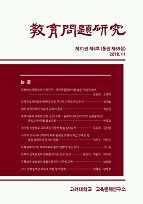한국의 그린스마트 미래학교와 미국의 Future Ready School의 비교 연구
A Comparative Study between ‘Green-smart Future School’ in Korea and ‘Future Ready School’ in the U.S : Focusing on Policy Goals and Policy Means
- 고려대학교 교육문제연구소
- 교육문제연구
- 第84輯
-
2022.08133 - 175 (43 pages)
-
DOI : 10.24299/kier.2022.353.133
- 187

본 연구는 한국의 그린스마트 미래학교와 미국의 Future Ready School(FRS)을 비교 분석하여, 한국의 미래교육정책이 성공적으로 집행되기 위한 시사점을 도출하는 데 목적을 두었다. 이 때, 분석의 대상은 정책목표와 정책수단에 중점을 두었다. 분석 결과, 첫째, 한국의 정책목표는 파편화된 목표와 높은 상징성으로 인해 미국에 비해 명확성이 떨어지는 측면이 있다. 둘째, 단일화된 미국 FRS의 정책목표에 비해 한국의 정책목표는 하위 목표 간의 논리적 연결성이 부족하고 상호 모순이 발생하여 일관성이 떨어짐을 확인하였다. 셋째, 비영리단체에 민간위탁 하는 통일된 방식의 미국 FRS의 집행기관에 비해 그린스마트 미래학교의 정책집행기관은 세분화 되어있음을 확인하였다. 넷째, 한국의 순응확보수단은 도덕적 설득과 강압, 미국의 순응확보수단은 도덕적 설득과 지원으로 확인되었다. 이를 바탕으로 본 연구에서는 다음의 네 가지 제언점을 도출하였다. 첫째, 정책목표의 상징적 모호성의 긍정적인 측면을 고려하더라도 정책집행의 올바른 방향성을 위해 보다 명확한 정책목표의 제시가 필요하며, 둘째, 단일한 정책목표의 설정은 현장의 융통성 발휘를 어렵게 한다는 한계가 있으나, 성공적인 정책 집행을 위해서는 일관성을 갖춘 논리적 목표 체계의 구성이 요구된다. 셋째, 미래교육이라는 새로운 패러다임에 상응하는 정책집행 체계를 갖출 필요가 있으며, 넷째, 미래교육정책 이해관계자의 순응을 이끌어내기 위해서는 쌍방향 의사소통을 통한 적극적인 지원이 수반되어야 한다.
This study aimed to compare ‘Green-smart Future School’ in Korea and ‘Future Ready School(FRS)’ in the United States, and to derive implications for the successful implementation of Korea's future education policy. The subject of the analysis focused on ‘policy goals’ and ‘policy means’. First, Korea’s policy goals have a lesser clarity than the United States due to fragmented goals and high symbolism. Second, compared to the unified policy goals of FRS, Korean policy goals lack consistency due to less logical connectivity among sub-goals and mutual contradiction. Third, the policy enforcement agencies of Green-smart Future School were subdivided, compared to the FRS’ unified manner entrusted to non-profit organizations. Fourth, the Korean compliance securing means was confirmed by normative persuasion and coercion, and the U.S compliance securing means was confirmed by normative persuasion and support. Based on this, four suggestions were derived as follows: First, even considering the positive aspects of symbolic ambiguity of policy goals, it is necessary to present clearer policy goals for the correct directionality of policy execution. Second, the setting of a single policy goal makes it difficult to exercise flexibility in the field, but a consistent logical goal system is required for successful policy execution. Third, it is necessary to establish a policy execution system corresponding to a new paradigm of future education. Finally, to induce compliance with future education policy stakeholders, active support through two-way communication must be accompanied.
Ⅰ. 서 론
Ⅱ. 이론적 배경
Ⅲ. 한국 그린스마트 미래학교와 미국 Future Ready School 개요
Ⅳ. 양 국가의 미래학교 정책 분석: 정책목표와 정책수단을 중심으로
Ⅴ. 결론 및 제언
참고문헌
(0)
(0)